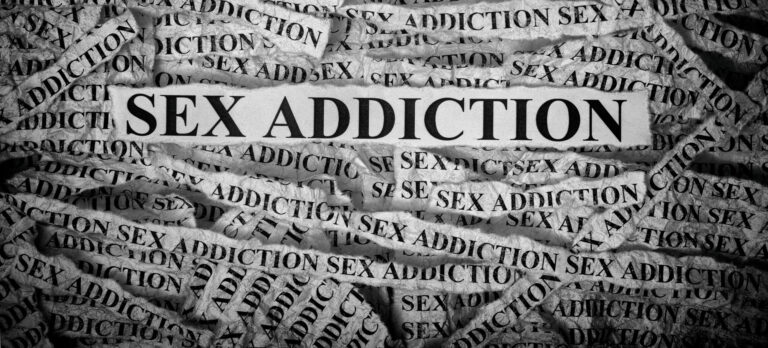Some individuals who battle a sex addiction recognize it but often refuse to acknowledge it, while others may be uncertain about their situation. Behaviors that are socially acceptable can still lead to significant personal fallout.
Inappropriate sexual actions might also surface alongside other forms of addiction. For instance, some may only cheat when under the influence of alcohol. Although drinking can be part of the problem, the act of cheating itself is an issue that may be glossed over if the primary focus remains on alcohol consumption.
Identifying when a healthy sexual interest turns into a compulsive behavior can be challenging. In this blog, we will explain sex addiction and highlight specific behavioral indicators to look out for. Recognizing these signs can better equip you to provide support for yourself or someone you care about.
What Are the Characteristics of a Sex Addict?
Like any form of addiction, sexual addiction exists on a continuum. On one end, individuals may cause harm to themselves or others or face legal issues. Conversely, some may conceal their actions and experience feelings of shame without facing any external consequences.
Those confronting serious repercussions are often more inclined to admit their problem; however, it’s not essential to reach that point first. Many think they can manage their behavior, only to find themselves surprised when they cannot. Seeking help sooner rather than later can avert grave consequences.
8 Indicators of Sex Addiction
Sex addiction can manifest in various ways, typically involving a profound sense of inability to control sexual cravings, even when aware of the problems caused. Below are some key indicators to keep an eye on, illustrated with practical examples for better understanding.
1. Preoccupation with Sex
Individuals struggling with sex addiction may continually think about sex, even when concentration is needed for other tasks. These thoughts can become so overwhelming that it becomes difficult for them to focus on anything else or complete daily responsibilities without being sidetracked by sexual urges.
Example:
A worker might be at their job yet frequently finds themselves browsing dating applications or looking for pornography online. Even in the middle of a meeting or project, their mind keeps reverting to sexual thoughts.
2. Increasingly Extreme Behaviors
Similar to many addictions, behaviors can progressively worsen. A person might start with one kind of sexual activity but soon feels the need to engage in more extreme or dangerous actions to achieve the same thrill, pushing them to pursue actions they normally wouldn’t consider.
Example:
Someone might begin by watching less explicit adult films but eventually seek out more graphic material. They may even resort to risky sexual practices like infidelity or unsafe sex simply to feel that rush again.
3. Neglecting Responsibilities
When sexual pursuits take precedence over other life aspects, individuals may begin to neglect essential responsibilities. They might skip work, school, or family commitments to engage in sexual activities and may also disregard their health or financial obligations.
Example:
A person may arrive late to their job due to overspending too much time on a dating platform or consuming pornography. They could miss significant appointments or family functions because their sexual urges feel demanding at that moment.
4. Emotional Numbness
Rather than utilizing sex to forge connections with others, someone with a sex addiction may use it to suppress their emotions. They may experience feelings of loneliness, sadness, or anxiety, with sex becoming their escape mechanism to numb those sentiments.
Example:
A person might have a partner at home but seeks casual sexual encounters or online pornography to avoid grappling with feelings of depression or anxiety. Although this offers temporary relief, it ultimately amplifies their sense of isolation.
5. Feeling Out of Control
A typical sign of addiction is the sensation of lacking control. Individuals might struggle to stop their sexual behavior, even if they truly wish to. They may promise themselves or their partners to change but end up reverting to their old habits.
Example:
After having a disagreement with a partner or getting caught in a lie, a person might vow to stop using dating apps or viewing pornography. Yet a few days later, they find themselves back in the same situation, feeling powerless to resist.
6. Feelings of Guilt and Shame
Many individuals with a sex addiction experience guilt post-acting on their desires, leading to a cycle of shame. In an attempt to evade these feelings, they might continue their behaviors, only to find themselves facing emotional turmoil.
Example:
A person could feel devastated after cheating on their partner but attempt to dull those feelings by compulsively watching pornography or engaging in more sexual encounters. The guilt compounds their distress, and yet they perpetuate the cycle.

7. Tension in Relationships
Sex addiction can severely disrupt relationships. If someone is concealing their behavior or putting their sexual needs above their partner’s emotional requirements, it can create a loss of trust and intimacy.
Example:
A partner may feel neglected or hurt because their significant other is preoccupied with their phone, either browsing sexual content or meeting new people. The addict may deny it or become defensive, leaving the other partner feeling betrayed.
8. Using Sex as a Coping Mechanism
For…
For many individuals experiencing sex addiction, engaging in sexual activities becomes a means to cope with stress or emotions that are difficult to manage. Rather than addressing their issues directly, they resort to sexual acts as a quick way to alleviate discomfort, albeit only temporarily.
Example:
After a challenging day at their job or an argument with a friend, someone may seek out casual sex or pornography to distract themselves from their feelings of stress or frustration. While this provides a brief escape from their emotions, those feelings tend to resurface even more intensely later.
Causes of Sex Addiction
There isn’t a single clear cause for sex addiction; instead, a variety of factors may play a role. Some of these factors relate to the brain’s functioning, while others may involve health concerns or individual emotional coping mechanisms. Below are some key contributors to sex addiction.
1. Imbalanced Brain Chemicals
Chemicals in the brain, such as serotonin, dopamine, and norepinephrine, are crucial for regulating mood, motivation, and pleasure. When these chemicals are out of balance, it can result in compulsive behaviors.
Elevated levels of specific chemicals may prompt the brain to seek out more stimulating activities like sex, as the brain links these activities to rewards.
2. Altered Brain Pathways
Compulsive sexual behavior does not materialize suddenly. Over time, the brain can modify its neural pathways, particularly in regions associated with reward and reinforcement.
These modifications can lead to the behavior feeling nearly automatic, akin to a habit that is tough to break. The continual “reward” from sexual actions reinforces those pathways, complicating efforts to stop.
3. Medical Conditions Impacting the Brain
Some medical conditions can directly affect the brain and alter sexual behavior. Conditions such as epilepsy, dementia, or other neurological disorders may impair the brain regions that govern impulses and conduct, which can result in heightened sexual desires or reduced self-control.
Additionally, certain medications meant to treat these issues might cause sexual side effects, inadvertently making an individual more susceptible to compulsive behaviors.

Risk Factors for Sex Addiction
- Gender – More prevalent in men, but it can impact anyone.
- Access to Content – Accessibility to sexual material and privacy can heighten compulsive tendencies.
- Technology & Social Media – These platforms expose individuals to more sexual content.
- Secrecy – The hidden nature of these actions can intensify addiction over time.
- Substance Abuse – Individuals battling alcohol or drug addiction face a greater risk.
- Mental Health – Issues like anxiety or depression can fuel compulsive sexual actions.
- Family Background – Family struggles or a history of addiction may heighten susceptibility.
- Previous Trauma – Experiences of physical or sexual abuse represent a major risk factor.
Do I Need Help for Sex Addiction?
If you’re questioning whether you might require assistance for sex addiction, it’s essential to consider several important questions. This form of addiction can subtly develop, often beginning as a manageable aspect of life but evolving into a challenging cycle to break.
The encouraging news is that acknowledging the issue is the first step toward seeking the help necessary. Reflect on these questions:
- Are sexual thoughts or actions dominating my time? – Do these urges or activities disrupt my job, relationships, or daily life?
- Have I attempted to quit but failed? – Even after promising to reduce my behaviors, do I find it impossible to follow through?
- Do I experience guilt or shame after succumbing to my sexual urges? – Does acting on my impulses leave me feeling regretful, yet I repeatedly do it?
- Am I pursuing riskier sexual endeavors? – Do I seek more extreme or dangerous experiences to achieve satisfaction?
- Is my sexual behavior damaging my relationships? – Is my sexual life creating conflict, distrust, or pain in my connections with others?
- Am I using sex as a way to manage my emotions? – Do I resort to sex to escape stress, sadness, or anxiety rather than confronting those feelings?
- Have I lost interest in activities I once loved? – Do I no longer find joy in hobbies or pastimes that used to excite me?
If you find yourself answering “yes” to any of these, it may indicate that it’s time to seek assistance. Asking for help is an important step toward discovering healthier coping strategies.
Sex Addiction Treatment at The Meadows
The Meadows provides residential treatment options for issues related to sexual addiction and compulsive behaviors. Gentle Path at The Meadows caters specifically to men, while Willow House at The Meadows is designated for women.
If you or someone you know is struggling with sex addiction, reach out to us today to initiate the healing journey and to learn which program is right for you.
Frequently Asked Questions about Sex Addiction
What distinguishes sex addiction from a high sex drive?
A high sex drive refers to a natural difference in sexual desire, which doesn’t disrupt a person’s life or cause harm. In contrast, sex addiction involves compulsive sexual behaviors that begin to dominate daily existence, leading to challenges in relationships, work, and other critical areas. It’s characterized by a loss of control and persistence in the behavior despite adverse outcomes.
Is there a cure for sex addiction?
While there may not be a traditional “cure” for sex addiction, it can be managed effectively through appropriate treatment and support. Therapy, counseling, and support groups can assist individuals in learning healthier methods of managing their urges and addressing the root causes of the addiction. With commitment and the right approach, recovery is achievable.
What effect does sex addiction have on mental health?
Sex addiction can greatly affect an individual’s mental health, often resulting in feelings of shame, guilt, and diminished self-esteem. Over time, it can lead to anxiety, depression, and a sense of isolation. The addiction often complicates the ability to form healthy relationships, and the emotional burden can be overwhelming, making it even harder to escape the cycle.
Is it possible to maintain a healthy relationship while struggling with sex addiction?
It can be difficult to enjoy a healthy relationship when dealing with sex addiction since the compulsion typically creates issues of trust, secrecy, and emotional distance. However, with the right treatment and support, it is possible to work towards rebuilding relationships. Both partners must be dedicated to the healing process, with open and honest communication being crucial.


